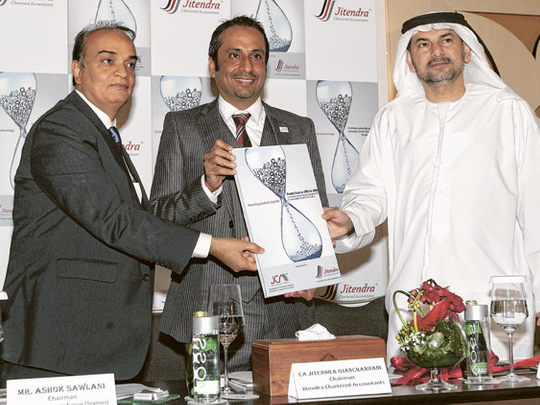
Dubai: UAE banks are expected to ease their lending criteria to small- and medium-sized enterprises (SME) this year, according to a study by a local accountancy firm.
The survey, by Jitendra Chartered Accountants, found that new reporting guidelines for SMEs would see lending increase from two per cent to 10 per cent by the end of 2011.
The International Accounting Standard Board (IASB) recently introduced a new abridged version of the International Financial Reporting Standards (IFRS) for SMEs as the full format is considered by many companies to be expensive and difficult to comprehend.
Jitendra Gianchandani, Chairman of Jitendra Chartered Accountants, said banks were more likely to lend to SMEs if they adjusted to the latest accounting principles.
"Banks are comfortable to lend to private companies that present their financial numbers in IFRS for SME format as against full IFRS, which is mainly for public listed companies," he said.
Direct link
"Large companies have to report higher levels of transparency owing to regulations. But small companies are not answerable to regulators or stakeholders — be it securities commission, stock exchanges, shareholders or promoters — and hence they have poor levels of financial disclosure and transparency," Gianchandani added.
Jitendra evaluated 1,000 local companies across various key sectors, including industry and manufacturing, IT, consumer products, chemicals, food and dairy, retail and hotels.
The firm, which yesterday released a new pocket book detailing the new IFRS for SMEs accounting principles, said an estimated 98.5 per cent of companies in the UAE are defined as SME using the Dubai SME definition.
Higher standards
Saed Al Awadi, CEO of Dubai Exports, an agency of the Dubai Department of Economic Development, said there was a direct link between SMEs providing a lack of financial information and lender inactivity.
He said: "Banks are more likely to lend to companies with higher IFR standards. The full IFR imposes a regulatory burden on SMEs, which is unnecessary as well as being expensive. I believe the adoption of this [new] standard will ensure that SMEs are able to increase their reporting efficiency."
Until now, SMEs have been following the "Full IFRS" format, which consists of 3,000 pages of guidelines.
The IASB, however, recently introduced a new 230-page version that features only 300 points for SMEs to implement new accounting standards.
Right time
Ashok Sawlani, Chairman of Textile Merchants Group, said: "Small merchants need deep support, especially during times of crisis. International Financial Reporting Standards for SMEs has been introduced at the right time and I am sure merchants will take full advantage of this.
"Of course, they will require training and guidance to learn the ropes," Sawlani said.
What do you think of this move? Will these new guidlines help more small-and-medium sized enterprises succeed? What does this mean for the UAE? Tell us what you think by posting a comment below.









